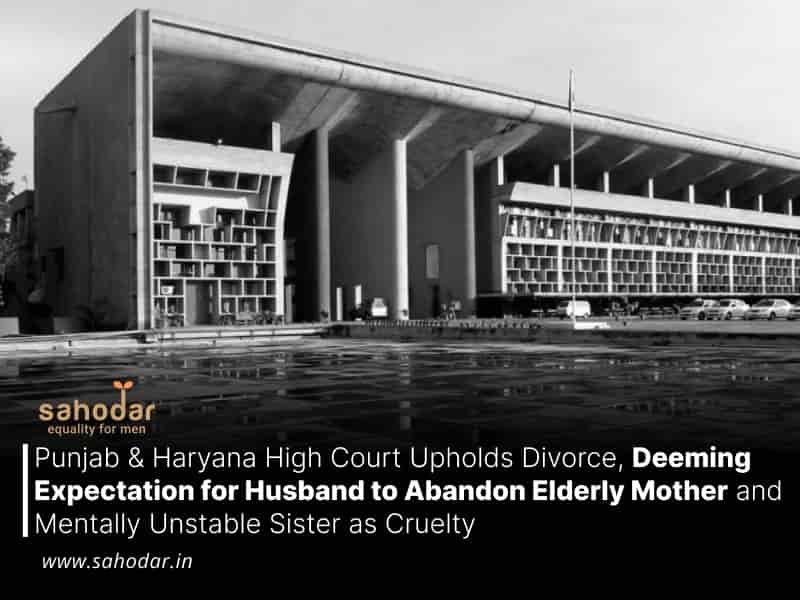The Punjab & Haryana High Court rejected the appeal of a wife contesting the divorce decree issued to the couple under the Hindu Marriage Act. The court remarked that requiring the husband to abandon his elderly mother, approximately 75 years old, and his mentally unstable sister constituted “cruelty.”
Justice Sudhir Singh and Justice Harsh Bunger said, “It needs no reiteration that when one enters into matrimony, one surrenders a part of one’s absolute freedom for the good of both and for the harmonious life of two alongwith their children (if any). Therefore, one should adjust his/her life pattern in the light of his/her marital obligations.”
The Court highlighted that the appellant’s expectation for her husband to reside with her, disregarding his elderly mother and mentally unstable sister, was assessed in alignment with the Supreme Court’s ruling in Narendra v. K. Meena, [2016(4) RCR (Civil) 706], concluding it as an “act of cruelty.”
The Court was presiding over an appeal lodged by a woman contesting the divorce granted to a couple married in 1999, as ruled by a Family Court in Haryana in 2019. The husband had initiated the divorce proceedings in 2016, citing “cruelty” as the grounds.
Following the presentations, the Court observed that the woman, along with her two daughters, had been living apart from her husband since 2016.
“From the evidence on record, it can be easily discerned that the appellant (woman) did not want to reside with the old mother and un-married sister of un-sound mind, of the respondent-husband,” said the Court.Top of Form
The record unequivocally demonstrates that the respondent was caring for his elderly mother and mentally unstable sister, while the appellant anticipated the husband to abandon them without care, the Court emphasized.
Speaking for the bench Justice Harsh Bunger said, “it is a fact that the spouses have separated since 2016 and they have not been able to re-unite and lead a normal matrimonial life all these years. It has come on record that the appellant was not ready to reside with her old mother-in-law and unsound mind sister-in- law.”
The Court commented, “Hence, it’s reasonable to infer that their marital bond has emotionally withered.”
The judge noted that the wife, by desiring separate living arrangements, seems to have personal motives; otherwise, she could have attempted to reconcile with her husband.
The Wife Appears Disinterested in Marital Harmony
Additionally, the bench observed that the woman has become a member of a spiritual group named ‘Braham Kumari,’ which promotes celibacy.
“As a circumstance to hold that the appellant does not seem to be interested in any conjugal bliss. It is well settled and as observed in the case of Samar Ghosh (), unilateral decision of refusal to have intercourse for considerable period without there being any physical incapacity or valid reason, may amount to mental cruelty,” the bench observed.
Considering the circumstances, the Court concluded that “the marriage between the parties has irretrievably broken down, and attempts at reconciliation would only result in prolonged disharmony, mental anguish, and cruelty if the divorce decree is reversed.”
Moreover, in affirming the divorce, the Court noted the absence of any alimony granted to the woman by the family court. It emphasized that Section 25 of the 1955 Act allows the wife to pursue claims for permanent alimony post-divorce. Hence, the Court retains jurisdiction to award alimony even after the decree is issued.
Consequently, while preserving the wife’s right to claim permanent alimony, the Court instructed the husband to pay an interim permanent alimony of Rs. 5 lakh to her within three months.

